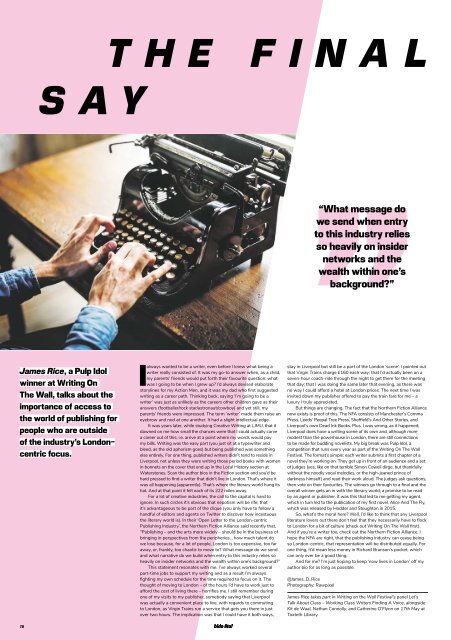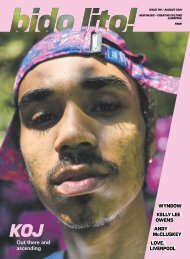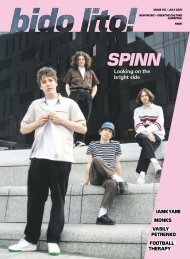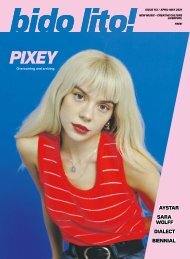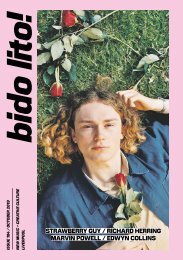Issue 88 / May 2018
May 2018 issue of Bido Lito! magazine. Featuring: ZUZU, SEATBELTS, LIGHTNIGHT, BOTH SIDES NOW (Stealing Sheep), PHOEBE BRIDGERS, SHAME and much more. Also featuring a 20-page section previewing Sound City 2018, featuring PEACE, IDLES, SUPERORGANISM, BAXTER DURY and a look at the festival's SOUND CITY+ conference.
May 2018 issue of Bido Lito! magazine. Featuring: ZUZU, SEATBELTS, LIGHTNIGHT, BOTH SIDES NOW (Stealing Sheep), PHOEBE BRIDGERS, SHAME and much more. Also featuring a 20-page section previewing Sound City 2018, featuring PEACE, IDLES, SUPERORGANISM, BAXTER DURY and a look at the festival's SOUND CITY+ conference.
Create successful ePaper yourself
Turn your PDF publications into a flip-book with our unique Google optimized e-Paper software.
SAY<br />
THE FINAL<br />
“What message do<br />
we send when entry<br />
to this industry relies<br />
so heavily on insider<br />
networks and the<br />
wealth within one’s<br />
background?”<br />
James Rice, a Pulp Idol<br />
winner at Writing On<br />
The Wall, talks about the<br />
importance of access to<br />
the world of publishing for<br />
people who are outside<br />
of the industry’s Londoncentric<br />
focus.<br />
I<br />
always wanted to be a writer, even before I knew what being a<br />
writer really consisted of. It was my go-to answer when, as a child,<br />
my parents’ friends would put forth their favourite question: what<br />
was I going to be when I grew up? I’d always devised elaborate<br />
storylines for my Action Men, and it was my dad who first suggested<br />
writing as a career path. Thinking back, saying ‘I’m going to be a<br />
writer’ was just as unlikely as the careers other children gave as their<br />
answers (footballer/rock star/astronaut/cowboy) and yet still, my<br />
parents’ friends were impressed. The term ‘writer’ made them raise an<br />
eyebrow and nod at one another. It had a slight intellectual edge.<br />
It was years later, while studying Creative Writing at LJMU, that it<br />
dawned on me how small the chances were that I could actually carve<br />
a career out of this; i.e. arrive at a point where my words would pay<br />
my bills. Writing was the easy part (you just sit at a typewriter and<br />
bleed, as the old aphorism goes) but being published was something<br />
else entirely. For one thing, published writers didn’t tend to reside in<br />
Liverpool, not unless they were writing those period books with women<br />
in bonnets on the cover that end up in the Local History section at<br />
Waterstones. Scan the author bios in the Fiction section and you’d be<br />
hard pressed to find a writer that didn’t live in London. That’s where it<br />
was all happening (apparently). That’s where the literary world hung its<br />
hat. And at that point it felt each of its 222 miles away.<br />
For a lot of creative industries, the call to the capital is hard to<br />
ignore. In such circles it’s obvious that nepotism will be rife; that<br />
it’s advantageous to be part of the clique (you only have to follow a<br />
handful of editors and agents on Twitter to discover how incestuous<br />
the literary world is). In their ‘Open Letter to the London-centric<br />
Publishing Industry’, the Northern Fiction Alliance said recently that,<br />
“Publishing – and the arts more widely – should be in the business of<br />
bringing in perspectives from the peripheries… how much talent do<br />
we lose because, for a lot of people, London is too expensive, too far<br />
away, or, frankly, too chaotic to move to? What message do we send<br />
and what narrative do we build when entry to this industry relies so<br />
heavily on insider networks and the wealth within one’s background?”<br />
This statement resonates with me. I’ve always worked several<br />
part-time jobs to support my writing and as a result I’m always<br />
fighting my own schedule for the time required to focus on it. The<br />
thought of moving to London – of the hours I’d have to work just to<br />
afford the cost of living there – horrifies me. I still remember during<br />
one of my visits to my publisher, somebody saying that Liverpool<br />
was actually a convenient place to live, with regards to commuting<br />
to London, as Virgin Trains run a service that gets you there in just<br />
over two hours. The implication was that I could have it both ways,<br />
stay in Liverpool but still be a part of the London ‘scene’. I pointed out<br />
that Virgin Trains charge £160 each way; that I’d actually been on a<br />
seven-hour coach-ride through the night to get there for the meeting<br />
that day; that I was doing the same later that evening, as there was<br />
no way I could afford a hotel at London prices. The next time I was<br />
invited down my publisher offered to pay the train fare for me – a<br />
luxury I truly appreciated.<br />
But things are changing. The fact that the Northern Fiction Alliance<br />
now exists is proof of this. The NFA consists of Manchester’s Comma<br />
Press, Leeds’ Peepal Tree Press, Sheffield’s And Other Stories, and<br />
Liverpool’s own Dead Ink Books. Plus, I was wrong, as it happened;<br />
Liverpool does have a writing scene of its own and, although more<br />
modest than the powerhouse in London, there are still connections<br />
to be made for budding novelists. My big break was Pulp Idol, a<br />
competition that runs every year as part of the Writing On The Wall<br />
Festival. The format’s simple: each writer submits a first chapter of a<br />
novel they’re working on. They get up in front of an audience and a set<br />
of judges (yes, like on that terrible Simon Cowell dirge, but thankfully<br />
without the noodly vocal melodies, or the high-jeaned prince of<br />
darkness himself) and read their work aloud. The judges ask questions,<br />
then vote on their favourites. The winners go through to a final and the<br />
overall winner gets an in with the literary world; a promise to be read<br />
by an agent or publisher. It was this that led to me getting my agent,<br />
which in turn led to the publication of my first novel, Alice And The Fly,<br />
which was released by Hodder and Stoughton in 2015.<br />
So, what’s the moral here? Well, I’d like to think that any Liverpool<br />
literature lovers out there don’t feel that they necessarily have to flock<br />
to London for a bit of culture (check out Writing On The Wall first).<br />
And if you’re a writer too, check out the Northern Fiction Alliance. I<br />
hope the NFA are right, that the publishing industry can cease being<br />
so London-centric, that representation will be distributed equally. For<br />
one thing, it’d mean less money in Richard Branson’s pocket, which<br />
can only ever be a good thing.<br />
And for me? I’m just hoping to keep ‘now lives in London’ off my<br />
author bio for as long as possible.<br />
@James_D_Rice<br />
Photography: Rawpixel<br />
James Rice takes part in Writing on the Wall Festival’s panel Let’s<br />
Talk About Class – Working Class Writers Finding A Voice, alongside<br />
Kit de Waal, Nathan Connolly, and Catherine O’Flynn on 17th <strong>May</strong> at<br />
Toxteth Library.<br />
78


